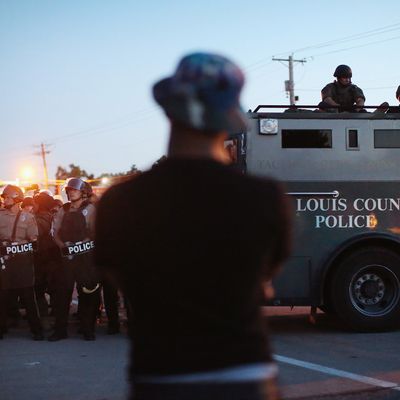
The outrage over the shooting death of Michael Brown escalated in part because of a sense that nothing had changed, that police officers were still operating in minority communities with a wantonness and brutality that belonged to another era.
But over the past two days — as the police in Ferguson have responded to very angry protests with an alarmingly heavy hand, looking and reacting as if they were not the community’s own peace officers but an invading army — something remarkable has happened. The longstanding liberal concerns about police racial hostility has seemed to merge with the longstanding libertarian concerns over police militarization. It isn’t just that no one is defending the cops. It’s that many of the criticisms from the left and the right sound very similar.
“We need to demilitarize this situation” is how Democratic Senator Claire McCaskill’s statement began this morning. The whole piece sounded awfully similar to Senator Rand Paul’s op-ed, which appeared a little bit later under the headline, “We Must De-Militarize the police.”
Kevin D. Williamson, the roving correspondent for the conservative journal National Review, wrote from Ferguson this morning of “ridiculously militarized suburban police … pointing rifles at people from atop armored cars, i.e. the worst sort of mall ninjas.” (This is the same Kevin D. Williamson who compared a black child to a primate 24 hours earlier.) In a similar vein, the liberal MSNBC host Chris Hayes introduced a segment on police militarization on his show last night by mentioning the surreal fact that the police — in a suburban setting, not a jungle, were wearing camouflage: “What exactly are they trying to camouflage into?”
By no means has every conservative been outraged by the police response in Ferguson. On Fox News this morning, the story was still that the protestors threw Molotov cocktails, and the police responded. But the argument against a militarized police is a longstanding libertarian concern, whose most dogged journalistic proponent has been the libertarian Radley Balko, author of The Rise of the Warrior Cop. Just as notably, the conservative perspective on law and order has been subtly changing, most obviously in the strengthening conservative enthusiasm for reforming prison sentencing, a cause embraced not only by libertarians like Mike Lee and Rand Paul but also by more conventional Republicans like Marco Rubio and Paul Ryan.
Even given this recent history, it was still striking today to see Rand Paul, in his statement, turn from more general concerns about the militarization of police to the specific topic of race: “Given the racial disparities in our criminal justice system, it is impossible for African-Americans not to feel like their government is particularly targeting them.”
This is exactly the argument that liberals have been making for an awfully long time, but that conservatives have rarely joined. It seems hard to imagine, given how clearly the conversation has turned to militarization, that we won’t hear more of this. Watching the reaction to Ferguson, it seems possible that the talk about police militarization might function as a convenient rhetorical backdoor, a way for both liberals and conservatives to address the siege mentality that seems to have taken hold in many police departments and the alienation that breeds in communities.
Militarization is not the deepest problem that surfaced in Ferguson: Race still is. But militarization may be the actionable one.





























